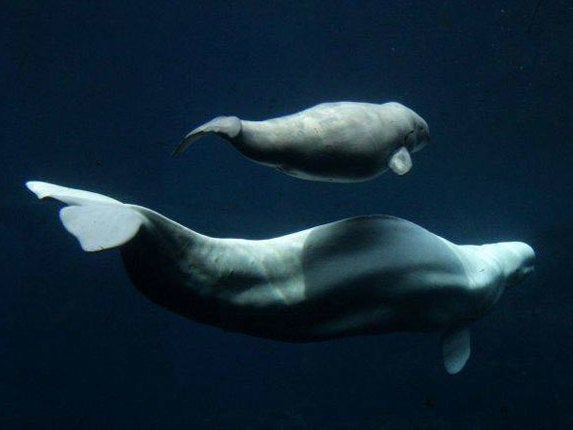Beluga whales and narwhals go through menopause in same way as humans, scientists find
'Older females' knowledge of where to find food helps groups survive – but if she keeps reproducing, her new young would compete with older offspring, researchers say

Your support helps us to tell the story
From reproductive rights to climate change to Big Tech, The Independent is on the ground when the story is developing. Whether it's investigating the financials of Elon Musk's pro-Trump PAC or producing our latest documentary, 'The A Word', which shines a light on the American women fighting for reproductive rights, we know how important it is to parse out the facts from the messaging.
At such a critical moment in US history, we need reporters on the ground. Your donation allows us to keep sending journalists to speak to both sides of the story.
The Independent is trusted by Americans across the entire political spectrum. And unlike many other quality news outlets, we choose not to lock Americans out of our reporting and analysis with paywalls. We believe quality journalism should be available to everyone, paid for by those who can afford it.
Your support makes all the difference.Beluga whales and narwhals go through the menopause in the same way as women, scientists have discovered.
Along with humans, other toothed whales – killer whales and short-finned pilots – were the only others previously known to experience the menopause.
Almost all animals continue reproducing throughout their lives, and scientists have long been puzzled about why some have evolved to stop doing so.
Most species in the wild continue reproducing until they die.
The new study, by the universities of Exeter and York and the Center for Whale Research, used data on dead whales from 16 species, and found dormant ovaries in the females of older belugas – small white mammals – and narwhals – medium-sized single-tusked creatures found in the Canadian and Greenland Arctic seas.
The researchers believe older females are useful to groups but if they continued having calves into old age, the new youngsters would be competing with her earlier offspring.
"For menopause to make sense in evolutionary terms, a species needs both a reason to stop reproducing and a reason to live on afterwards," said lead author Dr Sam Ellis, of the University of Exeter.
"In killer whales, the reason to stop comes because both male and female offspring stay with their mothers for life so as a female ages, her group contains more and more of her children and grandchildren.
"This increasing relatedness means that, if she keeps having young, they compete with her own direct descendants for resources such as food.
"The reason to continue living is that older females are of great benefit to their offspring and grand-offspring. For example, their knowledge of where to find food helps groups survive."
The study, published in journal Scientific Reports, also suggested that beluga whales and narwhals may have shared a common ancestor.
Research on ancient humans also suggests they lived among ever more relatives as they aged, and evolved similarly so they could impart their wisdom.
Join our commenting forum
Join thought-provoking conversations, follow other Independent readers and see their replies
Comments